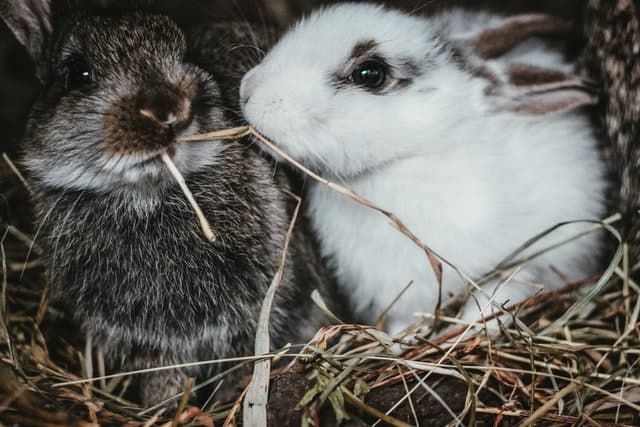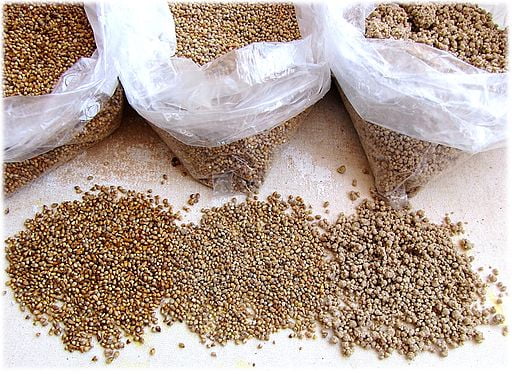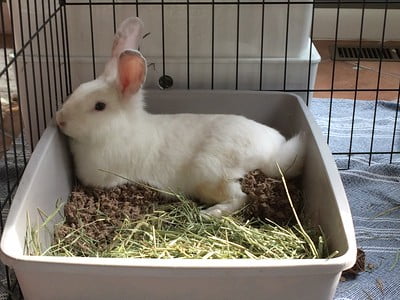Last Updated on March 19, 2023 by Marjon Ramos
Quick Facts About Grapes:
- Scientific name – Vitis vinifera
- Origin – The Mediterranean and Central Asia
- Most commonly found in – China, Chile, and the Netherlands.
Due to their size and availability, grapes are one of the best treats for rabbits.
You can safely feed your rabbits small amounts of grapes 1-2 times per week, but make sure that your rabbit is at least 7 months old before giving them one.
The amount of grapes you can give your rabbits should be dependent on their current age and weight.
But, you can safely give your rabbits one grape, given that they’re at least 7 months old, because a single grape is 5.1 grams, which is perfect for rabbits at any weight.
Now that I’ve given you the gist of the article, read on as I explain in more detail why rabbits can eat grapes:
Table of Contents
Do rabbits like eating grapes?
Grapes are universally liked by rabbits because rabbits are suckers for anything sweet.
In my case, both of my rabbits (Tyr and Freya) love eating grapes and would gobble up one immediately.
I’ve also asked several of my friends who are rabbit owners if they ever fed grapes to their rabbits and if their rabbits liked grapes.
All of them reported feeding grapes to their rabbits occasionally and that their rabbits loved grapes.
Are grapes safe to be eaten by rabbits?
As long as your rabbit is old enough (at least 7 months old) and you only give it 1-2 times per week in small amounts, then grapes are perfectly safe for rabbits.
The only way grapes could harm your rabbits is if you overfeed them in lieu of hay.
The lack of fiber would eventually lead to digestive problems because rabbit’s gut required fiber the most.
Although rare, grape pits should be removed because they’re a choking hazard.
Obese rabbits should not be fed sugary treats like grapes until your veterinarian says so.
Finally, overfeeding grapes could lead to dental problems due to the sugar content of grapes.
What are the benefits of feeding grapes to rabbits?
To properly identify the benefits of feeding grapes to your rabbits, let’s first take a look at what nutrients your rabbits are getting whenever you feed them grapes.
We can use this nutrient constraint calculator, which shows the different nutrients your rabbit is getting and if the amount you’re giving is within the nutritional constraint.
You can also click on the blue icon beside the nutrient to show the different benefits and deficiencies of each nutrient:
Nutrient Constrain Calculator For Rabbits
Warning:
Although grapes have these benefits, overfeeding your rabbit is not recommended. This is only to inform you of the different vitamins and minerals your rabbit can get when you give them grapes.
As you can see from the nutrient constrain calculator above, 100 grams of grapes contains very little nutrients.
But, as an occasional treat, it’s perfectly fine to have this low in nutrients because you should never rely on treats like grapes to meet your rabbit’s nutritional needs.
Doing so could lead to obesity, dental problems, or digestive problems.
Are grapes good for rabbits?
100 grams of grapes contain small amounts of vitamins A, E, and B6.
Grapes also contain copper, pantothenic acid, niacin, choline, protein, fiber, calcium, phosphorus, magnesium, and potassium.
All of which are great for rabbits and are still within the nutritional constraint for rabbits.
How many grapes can a rabbit eat?
The proper amount of grapes you should feed your rabbit would depend on their current weight and age.
You can use this nutrient constraint calculator to determine the amount of grapes (treats) you should give your rabbits:
Diet Portion Calculator For Rabbits
If you currently have no idea what your rabbit’s weight is, here’s a table of the different weights of rabbit breeds and how much grapes you can give:
| Rabbit’s weight based on breed | Allowed grapes |
|---|---|
| Small breed (1.1–3.5 pounds) | 1 teaspoon |
| Medium breed (6 to 10 pounds) | 1-2 tablespoon |
| Large breed ( 9 and 12 pounds) | 2-3 tablespoon |
When can rabbits start eating grapes?
The table above, which shows how many grapes you can give your rabbit, assumes that your rabbit is at least 7 months old.
Another important factor when deciding how many grapes to give your rabbits is their age.
Here’s a table that shows how many grapes you can give your rabbit based on their age:
| Age | Fruits |
|---|---|
| 7 weeks to 7 months | — |
| 7 months to 1 year | No more than 1-2 oz (30-60g) per 6 lbs (2.7 kg) BW |
| Adult (1-5 y) | No more than 2 tbsp per 6 lbs (2.7 kg) BW |
| Seniors (>6 y) | Talk to your veterinarian for a more specialized diet. |
When should you not feed grapes to rabbits?

Gist:
Rabbits that have intestinal issues or if they have diarrhea should not be fed grapes or other sugary treats.
When your rabbit already has diarrhea, feeding them unnecessary treats, especially sugary treats like grapes, is dangerous.
Since their gut flora is already out of balance (probably because of overfeeding sugary treats), feeding them more treats is fatal to them.
If your rabbit has any sign of intestinal issues like diarrhea, immediately remove any other food except hay and water and bring them to a vet that works with rabbits immediately.
Risks of overfeeding grapes to rabbits.
- Uneaten caecotrophs – Rabbits who are fed the wrong diet could suffer from uneaten caecotrophs due to a lack of fiber. You should always prioritize hay and only give your rabbits sugary treats like grapes as a treat.
- Obesity – Another risk of overfeeding grapes to rabbits is obesity. Grapes have a lot of sugar and starch and would increase the risk of obesity. The best diet for a rabbit would be a combination of fiber, protein, and fat.
- Gastrointestinal stasis – Gastrointestinal stasis happens when your rabbit is not eating enough fiber. Fiber is what moves your rabbit’s bowels and disruption of fiber from a rabbit’s diet could trigger GI stasis, which is fatal to rabbits.
- Diarrhea – Grapes, being high in sugar and starch, could disrupt the balance of your rabbit’s gut flora and trigger a bout of diarrhea. That’s why any sugary fruits that are high in starch are only recommended to be given as treats.
- Dental problems – Due to the sugar content of grapes, feeding your rabbits large amounts of them could lead to dental problems.
Great alternatives to grapes.
Here are some alternatives that you can give to your rabbits one to two times per week as a treat:
FAQ (Frequently Asked Questions)
-
Can rabbits eat grape seeds?
No, grape seeds can choke your rabbit because they’re too small. It’s better to feed them seedless grapes just to be safe.
-
Can rabbits eat grape skin?
Yes, rabbits can eat grape skin. Just make sure that you wash them first to remove any potential pesticide residue.
-
Can rabbits eat grape stalks?
Yes, rabbits can eat and nibble on grape stalks. But limit the amount you give them, and make sure that you wash them first to remove any potential pesticide residue.
-
Can rabbits eat grape leaves?
Yes, it’s safe to give grape leaves to rabbits. But limit the amount you give them, and make sure that you wash them first to remove any potential pesticide residue.
Conclusion
Rabbits can eat grapes. But only give them small amounts, 1-2 grapes for a medium-sized rabbit, and don’t give them every day.
Since the rabbit’s digestive system cannot process large amounts of sugar, it would likely cause digestive issues like diarrhea.
Similarly, rabbits that are growing or those that are less than 7 months old should not be given any grapes.
Young rabbits’ digestive systems cannot process sugar and carbs, which would cause diarrhea.
Finally, remember to hit your rabbit’s daily fiber requirement by feeding them hay before giving them any treats like grapes.
Some rabbits will refuse to eat unless it’s treats.
Cite this article:
Related Articles
- Can Rabbits Eat Asparagus? 9 things you need to know.
- Can Rabbits Eat Tomatoes? What You Need To Know.
- Can Rabbits Eat Watermelon? What You Need To Know.
- Can Rabbits Eat Broccoli? What You Need To Know.
- Can Rabbits Eat Apples? What You Need To Know.
- Can Rabbits Eat Cabbages? What You Need To Know.
- Can Rabbits Eat Strawberries? What You Need To Know.
- Can Rabbits Eat Bananas? What You Need To Know.
- Can Rabbits Eat Oranges? 9 things you need to know.
- Can Rabbits Eat Blueberries? Here’s Why.
- Can Rabbits Eat Spinach? Your Questions Answered.
- Can Rabbits Eat Cucumbers? Here’s Why.
- Can Rabbits Eat Celery? What you need to know.
- Can Rabbits Eat Radishes: Everything You Need To Know
Sources and further reading
- Basic Rabbit Care – Lafeber Company. lafeber.com/vet/wp-content/uploads/Basic-Rabbit-Care-2017.pdf.
- Blas, Carlos de., and Julian Wiseman. The Nutrition of the Rabbit. CAB International, 1998.
- Buseth, Marit Emilie., and Richard A. Saunders. Rabbit Behaviour, Health, and Care. CABI, 2014.
- Cheeke, Peter R. Rabbit Feeding and Nutrition. Academic Press, 1987.
- Lebas, F. The Rabbit: Husbandry, Health, and Production. Food and Agriculture Organization of the United Nations, 1997.
- Meredith, Anna, et al. BSAVA Manual of Rabbit Medicine. British Small Animal Veterinary Association, 2014.
- Meredith, Anna. “Is Obesity a Problem in Pet Rabbits?” Veterinary Record, British Medical Journal Publishing Group, 25 Aug. 2012, veterinaryrecord.bmj.com/content/171/8/192.
- Patry, Karen, et al. The Rabbit-Raising Problem Solver: Your Questions Answered about Housing, Feeding, Behavior, Health Care, Breeding, and Kindling. Storey Publishing, 2014.
- RABBIT NUTRITION – AN OVERVIEW – Vet Times. www.vettimes.co.uk/app/uploads/wp-post-to-pdf-enhanced-cache/1/rabbit-nutrition-an-overview.pdf.
- Richardson, V. C. G. Rabbits: Health, Husbandry and Diseases. Blackwell Science, 2002.
- Smith, Martin H, et al. “Rabbits – From the Animal’s Point of View, 3: Rabbit Nutrition.” EScholarship, University of California, 3 Jan. 2018, escholarship.org/uc/item/942046xj.
- Varga, Molly, and Frances Harcourt-Brown. Textbook of Rabbit Medicine: Revised and Edited. Elsevier, 2014.
- Gastrointestinal stasis




